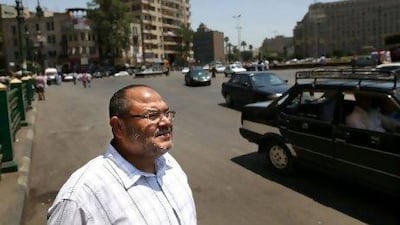CAIRO // After 23 years in exile, Osama Rushdi looked past the violence unfolding on his television in his house in Birmingham, England and saw a chance to return home, something that hundreds of Egyptians abroad had not been able to do for decades.
Mr Rushdi, 52, a former member of the radical Islamist group Al Gamaa al Islamiya, fled Egypt in 1989 after a period of what he describes as serial harassment, an eight-day torture session and a three-year stint in prison without ever being charged. After fleeing the country, he passed through Saudi Arabia, Pakistan, Albania and the Netherlands, before finally ending up in the UK.
"At this time, I knew Egypt was going to hell," he says. "It was a very bad situation. There was no place for me there and they forced me to leave."
But on June 15, he stepped off a British Midland International flight onto the soil of his homeland for the first time in more than two decades. The only problem, he says, is that he stepped straight into police custody.
Security officials kept him in a cell at the airport overnight before transferring him to the State Security Prosecutor's office in Cairo. There, they pointed to an old case, No 502 of 1994, where there were allegations that he was trying to overthrow the old regime.
"I [asked] them: 'what regime?'" Mr Rushdi says. "You just had a revolution. We are working for a new Egypt and you are still working with the old strategies. There are many people in the security who are from the old days."
He was released on the evening of June 16. Since then, he has been preparing for the return of his entire family to Egypt and contemplating getting back into politics. He is considering running as an independent Islamist candidate for parliament.
Under Hosni Mubarak's government, Islamist groups were violently suppressed, but Egypt's revolution has changed the political spectrum.
New political parties are forming with membership ranging from the moderate Muslim Brotherhood to ultraconservative Salafists and former militants.
John Calvert, a professor at Creighton University in Nebraska and an expert on the Islamic thinker Sayyid Qutb, said: "Chastened by the state, these groups have been lying low over the past decade or so. Now they are coming out of the woodwork and becoming politically involved for the first time."
Even Mr Rushdi's old group, the Al Gama'a al Islamiya, has announced it would create a party. This is a far cry from the terrorist attacks the group took credit for in the 1990s that killed hundreds of people.
The group's spiritual leader is Omar Abdel Rahman, who is serving a life sentence in the US for his role in the bombing of the World Trade Center in New York in 1993.
Hundreds of Islamists, barred by Mr Mubarak from the country, are preparing to return, says Montasser El Zayat, an Islamist lawyer and one-time prison mate of Al Qaeda's new chief, Ayman Al Zawahiri.
"I get calls every day" from exiled Islamists, he says. "For now, I have told them to wait. They will have their chance soon."
Mr El Zayat says there was nothing wrong with their return. They were unfairly targeted by the old government for their views and now sought to come home, he says.
"These are sons of this country," he says. "It's strange to ask: 'Why does an Egyptian want to return to his country?'"
Some of the returnees may associate themselves with Mr El Zayat's political party, the Union for Freedom, which calls for a government ruled by Sharia that focuses on an equal system of justice for all citizens and a greater role of the state in promoting the virtues of Islam.
The Egyptian security establishment has been keeping a close eye on the return of exiles and in some cases detained those that have been abroad indefinitely, on their return.
Rabie Abdullah, an alleged member of Al Qaeda, was arrested in mid-June when he fled Yemen with his wife and three children. Abdullah had been convicted in absentia for an undisclosed act of terrorism and sentenced to five years to prison. He is now being held by the authorities.
Mr Rushdi says that many exiles had false cases fabricated against them or simply could not return for fear of harassment, but there is a minority of the group who have actually been involved with terrorist activities.
"For these people, Egypt cannot handle their return," he says. "But for the others, this is important. The country needs to open up to them. If you close the door, you push them to continue acting in the wrong way. If all countries in the world did this, it would be more peaceful."
It is a touchy subject for the United States, which last month said the return of extremists to the Middle East was a counter-terrorism concern, particularly in light of the popular revolutions that have toppled governments in Egypt and Tunisia. John Brennan, the assistant to the president for homeland security and counterterrorism, said at the time that regional "changes may bring new challenges and uncertainty in the short-term, as we are seeing in Yemen".
For Mr Rushdi, however, returning to his homeland is an important act of justice, crucial to prompting a wider debate in the upcoming elections.
"I will keep my independence, but I want to build many relationships with political people in Egypt from all directions," he said. "I think there are so many opportunities now. But after 23 years, I need some time to think. I'm not in a hurry to take any step."
It is also a long-awaited reunion with his family, some of whom he hasn't seen throughout the period he has been abroad.
"My siblings were girls and boys when I left," he says. "Now they are married and have children.
"It is a completely different world."

